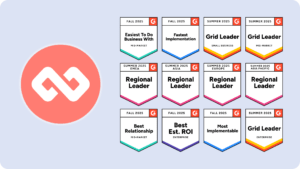The sales team is the key driver of revenue and growth for many organizations. A team of well-oiled, well-trained, and engaged reps can make all the difference. So it makes sense to offer them a lot of development support. However, when it comes to L&D, sales teams often get the usual structured, formal, and normally off-site training in a plethora of weird and wonderful sales strategies. Having attended a few myself, I can testify that it can be a mixed bag in terms of the tangible effects and whether or not I found them useful. We know the effect that mentoring can have on skills development, staff retention, and promotion rates. But let’s take a look at why mentoring for sales teams, specifically, is crucial.

Sales is hard and it’s getting harder
Sales has never been an easy career choice. And if you ask most salespeople, it hasn’t gotten easier over the last few years with the pandemic, economic instability, and a changing buyer marketplace.
Reps stuck in a rut or fighting to close every deal need a supportive hand to encourage them, workshop with them, help them find ways to innovate, and let off steam. While some of this is the traditional realm of the manager, having a mentor step in as well helps create a network of support and gives reps an opportunity to learn from multiple professionals in your company or industry.
Sales is learnt not taught
Being a great salesperson doesn’t come from a specific education. Even business degrees spend very little time training graduates to become killer salespeople. Almost every new salesperson starts with a handful of inherent skills and a bucket full of drive and learns the rest as they go.
Having a trusted mentor in these early days to impart their wisdom and knowledge cuts out some of the trial and error. I, myself, was given a great piece of advice in my early days about slowing down my speech on cold calls. Not only did it have a great effect on my close rates but it’s also something I still remind myself of to this day. Frankly, without this mentorly advice I wouldn’t have known!
Turn your salespeople into sales managers
The rate of hiring in mid-level sales management positions is rising year by year. However, top-class revenue closers don’t always make seamless transitions to people managers.
Mentoring your quality salespeople as part of your succession planning safeguards your company, shows your people that you value them, and has an alarming effect on retention rate.
On the other hand, having your next generation of leaders become mentors teaches valuable soft skills in helping set goals, development planning, training, and becoming a trusted listening ear. Win, Win!
How to get it right
Formalise your mentoring program
Formalising your mentoring program and opening it up to everyone in your sales team (not just “high potentials”) takes the luck and bias out of access. Most people won’t tell their direct supervisors if they want or need support. Just making this opportunity available to everyone cuts out the need for that kind of conversation – they can just jump in.
A formal mentoring program helps you keep people accountable. Most company-sponsored formal programs are monitored and measured, so this gives participants some additional motivation to progress.
Use Mentoring Software
Speaking of monitoring, you can only really effectively do this when you have a proper program set up with mentoring program software like Mentorloop. One of the benefits of being able to keep an eye on your program in this way is that a program coordinator can see everything at a glance.
On Mentorloop, your Program Dashboard shows how a program is growing, where participants are in their journey, and the health of the mentoring relationships, among other important data points. These things can help make sure your program is running smoothly and helps identify areas for improvement or who needs support.
Mentoring software is also useful for mentors and mentees. Software makes it easy for them to get or find a mentoring match, manage their mentoring relationships, track their goals, get support, and give feedback.
See how Mentorloop helps you do all of this with minimal hassle and time commitment.
Support your mentors
Not all great employees can be great mentors – it takes different skill sets, especially in sales. So it would be great if you can give your mentors proper prep in the form of training or support materials. It’s good to get them trained in basic skills such as active listening and cultural literacy, or equipped with good questions to ask or how to help mentees with goal-setting.
However, in lieu of time or capacity for this, Mentorloop supports your mentors (and your mentees!) with content that guides them through their mentoring journey.
Encourage goals that are not KPI/revenue driven
Trust me, your salespeople know all about these goals and how close they are to achieving them. These goals are always at the forefront of their working life and chances are, they’re already working really hard to hit them.
Your mentoring program is not the place to further emphasise the importance or urgency of these revenue goals. Instead, the purpose of your mentoring program is to support the skills and knowledge your sales team feels they need to hone or gain to achieve those goals. Their goals for the program should reflect that, not their sales targets.
Final thoughts
Supporting your sales teams has never been more important or frankly easier. Make the most out of your L&D spend, ramp up your revenue performance, and increase your retention rate by implementing mentoring for your sales team!
Ready to turbocharge your sales team? Get started in 4 easy steps with Mentorloop Pro!




